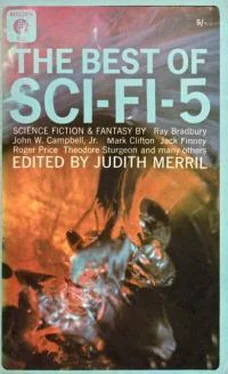The Best of Sci-Fi-5
Здесь есть возможность читать онлайн «The Best of Sci-Fi-5» весь текст электронной книги совершенно бесплатно (целиком полную версию без сокращений). В некоторых случаях можно слушать аудио, скачать через торрент в формате fb2 и присутствует краткое содержание. Год выпуска: 1966, Издательство: Mayflower-Dell, Жанр: Фантастика и фэнтези, на английском языке. Описание произведения, (предисловие) а так же отзывы посетителей доступны на портале библиотеки ЛибКат.
- Название:The Best of Sci-Fi-5
- Автор:
- Издательство:Mayflower-Dell
- Жанр:
- Год:1966
- ISBN:нет данных
- Рейтинг книги:3 / 5. Голосов: 1
-
Избранное:Добавить в избранное
- Отзывы:
-
Ваша оценка:
- 60
- 1
- 2
- 3
- 4
- 5
The Best of Sci-Fi-5: краткое содержание, описание и аннотация
Предлагаем к чтению аннотацию, описание, краткое содержание или предисловие (зависит от того, что написал сам автор книги «The Best of Sci-Fi-5»). Если вы не нашли необходимую информацию о книге — напишите в комментариях, мы постараемся отыскать её.
The Best of Sci-Fi-5 — читать онлайн бесплатно полную книгу (весь текст) целиком
Ниже представлен текст книги, разбитый по страницам. Система сохранения места последней прочитанной страницы, позволяет с удобством читать онлайн бесплатно книгу «The Best of Sci-Fi-5», без необходимости каждый раз заново искать на чём Вы остановились. Поставьте закладку, и сможете в любой момент перейти на страницу, на которой закончили чтение.
Интервал:
Закладка:
But, if you add heat, more and more and more, the ice cube will change, not only its shape, but its state. What it was previously capable of doing only slightly and impermanently, it can now do completely. The critical point has been passed.
Roughly—for the analog itself is rough—the same things occurs in the human mind. The psionic abilities of the human mind are, to a greater or lesser degree, there to begin with, just as an ice cube has the ability to melt if the proper conditions are met with.
The analogy hardly extends beyond that. Unlike an ice cube, the human mind is capable of changing the forces outside it—as if the ice could seek out its own heat in order to melt. And, too, human minds vary in their inherent ability to absorb understanding. Some do so easily, others do so only in spotty areas, still others cannot reach the critical point before they break. And still others can never really understand at all.
No one who had not reached his own critical point could become a “core” member of the S.M.M.R. It was not snobbery on their part; they understood other human beings too well to be snobbish. It was more as though a Society for Expert Mountain Climbers met each year on the peak of Mount Everest—anyone who can get up there to attend the meeting is automatically a member.
Spencer Candron sat down in a nearby chair. “All right, so I refrain from doing any more damage than I have to. What’s the objective?”
Taggert put his palms on his muscular thighs and leaned forward. “James Ch’ien is still alive.”
Candron had not been expecting the statement, but he felt no surprise. His mind merely adjusted to the new data. “He’s still in China, then,” he said. It was not a question, but a statement of a deduction. “The whole thing was a phony. The death, the body, the funeral. What about the executions?”
“They were real,” Taggert said. “Here’s what happened as closely as we can tell:
“Dr. Ch’ien was kidnaped on July 10th, the second day of the conference in Peiping, at some time between two and three in the morning. He was replaced by a double, whose name we don’t know. It’s unimportant, anyway. The double was as perfect as the Chinese surgeons could make him. He was probably not aware that he was slated to die; it is more likely that he was hypnotized and misled. At any rate, he took Ch’ien’s place on the rostrum to speak that afternoon.
“The man who shot him, and the man who threw the flame bomb, were probably as equally deluded as to what they were doing as the double was. They did a perfect job, though. The impersonator was dead, and his skin was charred and blistered clear up to the chest—no fingerprints.
“The men were tried, convicted, and executed. The Chinese government sent us abject apologies. The double’s body was shipped back to the United States with full honors, but by the time it reached here, the eye-cone patterns had deteriorated to the point where they couldn’t be identified any more than the fingerprints could. And there were half a hundred reputable scientists of a dozen friendly nations who were eye-witnesses to the killing and who are all absolutely certain that it was James Ch’ien who died.”
Candron nodded. “So, while the whole world was mourning the fact that one of Earth’s greatest physicists has died, he was being held captive in the most secret and secure prison that the Red Chinese government could put him in.”
Taggert nodded. “And your job will be to get him out,” he said softly.
Candron said nothing for a moment, as he thought the problem out. Taggert said nothing to interrupt him.
Neither of them worried about being overheard or spied upon. Besides being equipped with hush devices and blanketing equipment, the building was guarded by Reeves and Donahue, whose combined senses of perception could pick up any activity for miles around which might be inimical to the Society.
“How much backing do we get from the Federal Government?” Candron asked at last.
“We can swing the cover-up afterwards all the way,” Taggert told him firmly. “We can arrange transportation back. That is, the Federal Government can. But getting over there and getting Ch’ien out of durance vile is strictly up to the Society. Senator Kerotski and Secretary Gonzales are giving us every opportunity they can, but there’s no use approaching the President until after we’ve proven our case.”
Candron gestured his understanding. The President of the United States was a shrewd, able, just, and ethical human being—but he was not yet a member of the Society, and perhaps would never be. As a consequence it was still impossible to convince him that the S.M.M.R. knew what it was talking about—and that applied to nearly ninety per cent of the Federal and State officials of the nation.
Only a very few knew that the Society was an ex officio branch of the government itself. Not until the rescue of James Ch’ien was an accomplished fact, not until there was physical, logical proof that the man was still alive would the government take official action.
“What’s the outline?” Candron wanted to know.
Taggert outlined the proposed course of action rapidly. When he was finished, Spencer Candron simply said, “All right. I can take care of my end of it.” He stood up. “I’ll see you, Brian.”
Brian Taggert lay back down on the couch, propped up his feet, and winked at Candron. “Watch and check, Spence.”
Candron went back down the stairs. Mrs. Jesser smiled up at him as he entered the reception room. “Well! That didn’t take long! Are you leaving, Mr. Candron?”
“Yes,” he said, glancing at the wall clock. “Grab and run, you know. I’ll see you soon, Mrs. Jesser. Be an angel.”
He went out the door again and headed down the street. Mrs. Jesser had been right; it hadn’t taken him long. He’d been in Taggert’s office a little over one minute, and less than half a dozen actual words had been spoken. The rest of the conversation had been on a subtler level, one which was almost completely nonverbal. Not that Spencer Candron was a telepath; if he had been, it wouldn’t have been necessary for him to come to the headquarters building. Candron’s talents simply didn’t lie along that line. His ability to probe the minds of normal human beings was spotty and unreliable at best. But when two human beings understand each other at the level that existed between members of the Society, there is no need for longwinded discourses.
The big stratoliner slowed rapidly as it approached the Peiping People’s Airfield. The pilot, a big-boned Britisher who had two jobs to do at once, watched the airspeed indicator. As the needle dropped, he came in on a conventional landing lane, aiming for the huge field below. Then, as the needle reached a certain point, just above the landing minimum, he closed his eyes for a fraction of a second and thought, with all the mental power at his command: NOW!
For a large part of a second, nothing happened, but the pilot knew his message had been received.
Then a red gleam came into being on the control board.
“What the hell?” said the co-pilot.
The pilot swore. “I told ‘em that door was weak! We’ve ripped the luggage door off her hinges. Feel her shake?”
The co-pilot looked grim. “Good thing it happened now instead of in mid-flight. At that speed, we’d been torn apart.”
“ Blown to bits, you mean,” said the pilot. “Let’s bring her in.”
By that time, Spencer Candron was a long way below the ship, falling like a stone, a big suitcase clutched tightly in his arms. He knew that the Chinese radar was watching the jetliner, and that it had undoubtedly picked up two objects dropping from the craft—the door and one other. Candron had caught the pilot’s mental signal—anything that powerful could hardly be missed—and had opened the door and leaped.
Читать дальшеИнтервал:
Закладка:
Похожие книги на «The Best of Sci-Fi-5»
Представляем Вашему вниманию похожие книги на «The Best of Sci-Fi-5» списком для выбора. Мы отобрали схожую по названию и смыслу литературу в надежде предоставить читателям больше вариантов отыскать новые, интересные, ещё непрочитанные произведения.
Обсуждение, отзывы о книге «The Best of Sci-Fi-5» и просто собственные мнения читателей. Оставьте ваши комментарии, напишите, что Вы думаете о произведении, его смысле или главных героях. Укажите что конкретно понравилось, а что нет, и почему Вы так считаете.












